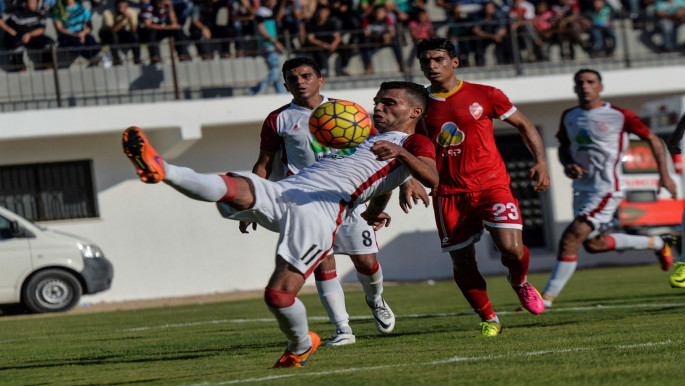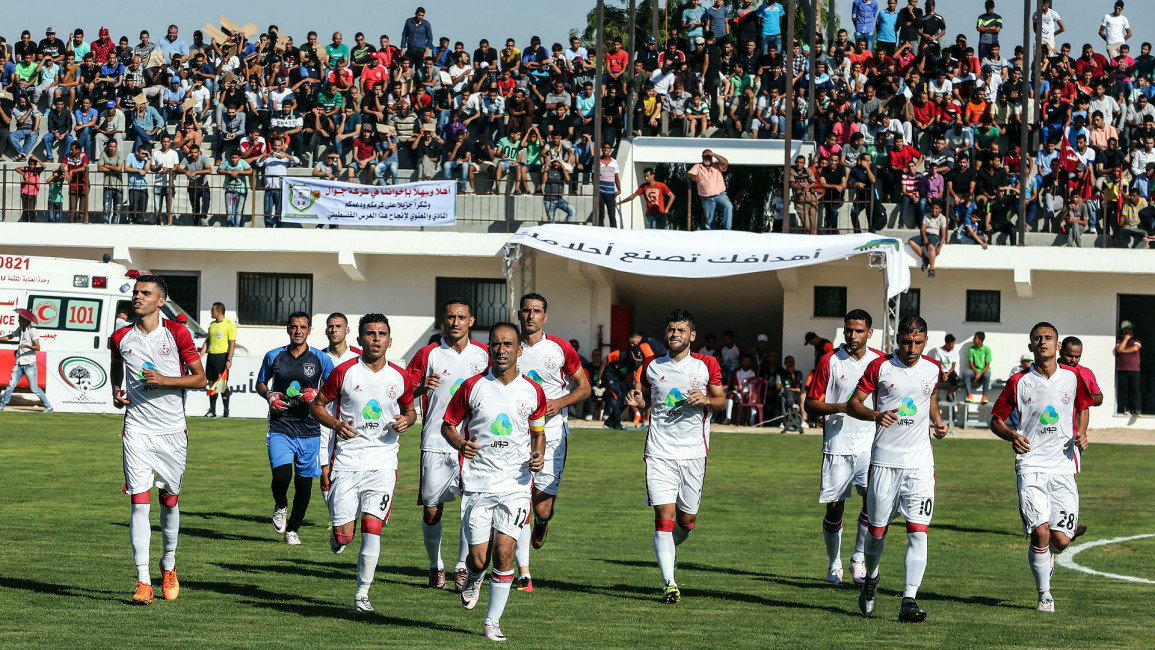
Palestine Cup set for final showdown, despite Israel's foul-play
Footballer Abdallah Jaber stood at the Erez crossing last Tuesday, waiting to be allowed into Gaza for the first leg of the Palestine Cup final.
"No one knows if we will be given the permits to cross the border," remarked the star of the Ahli Al-Khaleel and Palestine national team. His sentiment captured the air of the entire tournament.
The final - the second leg of which is due to be played on Tuesday afternoon - is the silver lining of the cloudy Palestinian football season: a double-header between the Gazan Cup winners and their West Bank counterparts.
The chasm between West Bank and Gaza football is immense: facilities, salaries and talent resources are far more developed in the hills of the West Bank than on the shores of Gaza.
This year, Shabab Khan Younis from Gaza meets Ahli Al-Khaleel from Hebron. The winner will go on to play in the qualifying rounds of the Asian Football Confederation Cup, and will represent Palestine on the continental stage.
It is the second year in a row that the competition has taken place in its renewed format, after last year's historic clash between Ittihad Shujaiya and Ahli Al-Khaleel, when teams from Gaza and the West Bank played against each other for the first time in fifteen years.
The final of the Palestine Cup is a spectacle of Palestinian politics and social dynamics. The Palestinian territories are divided between the Fatah-administered West Bank and the reign of Islamist movement Hamas in Gaza; Israel stretches between these two semi-autonomous entities.
 |
|
| Muhammed Ebu Musa of Shabab Khan Younis was in action during the first leg of the Palestine Cup final [Anadolu] |
Jibril Rajoub, director of the Palestinian Football Association, re-established the event last season and highlighted its significance in bringing together Hamas and Fatah to co-sponsor the match.
"[The] Palestine Cup is bringing Palestinian people together, through football," he said last summer; in the local media here, the event is celebrated as "The Great National Wedding".
Yet this year, some of the grooms may unwillingly miss the ceremony. Movement between the West Bank and Gaza is heavily monitored and regulated by the Israeli military and the Israeli office of Coordination of Government Activities in the Territories (COGAT).
Last Tuesday, eight Ahli squad members were denied permits to enter Gaza, among them four key players - Palestinians with Israeli citizenship; Palestinian superstar Abdallah Jaber was one of them.
A few members of the PFA called for the match to be cancelled without the key personnel, but eventually it was decided not to let the Israeli authorities ruin the party, and the first leg match kicked off.
More than 13,000 fans poured into Gaza City's Al-Yarmouk stadium. Khan Younis kicked off the match with enthusiasm, but the differences between the teams quickly started to show and Ahli took over the pitch.
Ahli's fanbase in Hebron is small, overshadowed by city rivals Shabab Al-Khaleel's massive support. But despite its small size, Ahli gained popularity among Gazans when the team visited the embattled Strip last summer.
And the Hebron team's Gazan fans were treated to a display worth talking about: Islam al-Bitran's masterful solo effort won Ahli a 1-0 victory. The match concluded with mutual friendliness; both teams were excited to meet again soon, unaware of the obstacles lying ahead.
On Wednesday, the day after the first leg, the Shabab Khan Younis squad began its trip to the West Bank for the concluding game - but were held at the Erez Crossing for more than ten hours, while Israeli officials investigated each team member.
Eight of the delegation, including six players, weren't allowed to cross through. Israeli security approved of only eleven players, the coach and a few of the management team. The reason? "Security issues". Further details were not provided.
Furthermore, Ahli's Gaza-born players - Mohammed Sitry and Mahmoud Wadi - were also not allowed to pass the crossing to return to their adopted hometown. Wadi, Ahli's leading striker and one of Palestinian football greatest promises, remains stuck in Gaza, his future mired in uncertainty.
On Thursday, Shabab's reduced team arrived in Hebron with a roster terribly lacking their top talent.
On Saturday, the day of the match, it was still unclear if it would even take place at all. Just four hours before kickoff, Jibril Rajoub declared a 48-hour delay, in order to double efforts to obtainpermission for the Gazan players to make the trip.
Rajoub - who recently lobbied the FIFA Congress to take action against Israel for violating Palestinian footballers' freedom of movement - again exposed Tel Aviv's brutal policy towards Palestine's football development: "We will not play this match until each and every player of Khan Younis team is here in Hebron," he said on Saturday.
The second leg is still due to be played on Tuesday afternoon, with a 16:30 kick-off time - and with the Israeli authorities appearing to relent, on Monday morning allowing six Khan Younis players, their goal-keeping coach and a journalist to make the journey - it looks like we might have a game after all.
Ahli, now bolstered by their well-rested Israeli-Palestinian stars who were denied access to Gaza, are expected to have the upper hand and grab the trophy, modelled after the map of Mandate-era Palestine.
The 2016 Palestine Cup final was supposed to be a football festival, and an opportunity to embrace a united Palestinian identity. But the Israeli blockade of Gaza continues to frustrate the growth of Palestinian football.
"We just want this saga to end and to play this game," concluded Jaber. "I wish there will be peace, so we can break free from all these problems. We just seek some peace of mind. Really."
Uri Levy runs the popular football blog BabaGol, which covers football and politics focusing on the Middle East. Follow him on Twitter, and read his blog here.


![President Pezeshkian has denounced Israel's attacks on Lebanon [Getty]](/sites/default/files/styles/image_684x385/public/2173482924.jpeg?h=a5f2f23a&itok=q3evVtko)



 Follow the Middle East's top stories in English at The New Arab on Google News
Follow the Middle East's top stories in English at The New Arab on Google News


